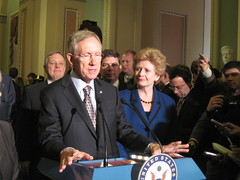North Carolina is home to one of the great examples of how economies flourish when government gets involved: the Research Triangle Park. It was developed in the 1950s by a public-private partnership, depended heavily on more than one governor’s leadership and on the proximity of three major research universities (two of which are public), and succeeded in fundraising after it was granted nonprofit status from the state. It was designed with the goal of helping North Carolina transition into the modern economy, and it worked.
But a candidate for governor named Pat McCrory wants to turn the state into a low-tax, low-service loser that could never undertake such a visionary project. While McCrory takes full credit for overseeing Charlotte’s economic boom while he ran that city as its Mayor, if he follows through on his anti-government campaign promises, North Carolina won’t have the resources to usher in the economic boom McCrory says he can deliver statewide.
McCrory has made cutting taxes the centerpiece of his campaign for governor. He has pledged to cut the corporate income tax, the individual income tax and the estate tax if elected. Sadly, yet predictably, this candidate has also refused to release any details about the structure of these proposals, including their bottom-line cost in terms of revenues. What we do know, though, is that he’d have a friendly audience in the state capital, where GOP leaders – who control the legislature – have already proposed the outright elimination of personal and corporate income taxes.
As the Institute on Taxation and Economic Policy (ITEP) has explained, corporate and personal income taxes are among the few tools state policymakers have for minimizing the stark regressivity of state tax systems, including North Carolina’s. An analysis (PDF) of all state and local taxes paid by Tar Heel State residents shows that the highest earners pay a far smaller portion of their income in taxes than do middle- and low-income families. McCrory’s proposed tax cuts would only exacerbate this gap. Indeed, the candidate has held up Tennessee and Florida as his models for state tax policy—two states that also happen to be among the five most regressive state tax systems in the country.
But McCrory doesn’t talk about tax fairness. Instead, he presents the party line and says tax cuts are a means to support North Carolina’s “economic development brand,” which he claims is diminished by high taxes.
Here are three reasons he is wrong.
One, while the state’s unemployment rate is stubbornly high (9.4 percent), the cause is the state’s dependence on waning manufacturing jobs, not its tax policy. The unemployment rate is just as high across the border in manufacturing-dependent South Carolina despite that state’s lower business and personal income tax rates. Two, as the News & Observer points out, North Carolina is already regarded as being very business-friendly in national surveys of executives and industrial recruiters. And three, as research from ITEP has shown, supply side arguments for cutting taxes to grow the economy simply do not hold up in the face of evidence.
Instead of making the state more enticing to business, McCrory’s race-to-the-bottom strategy on tax policy would threaten the public services that make the state so appealing. North Carolina’s public investments are already suffering from acute budget cuts. The legislature recently dealt a blow to the University of North Carolina system and the community college system, as well as to job recruitment and economic development programs. McCrory’s tax cuts would make additional cuts to such critical public programs all but inevitable, exacerbating the economic slump that is, of course, a nationwide phenomenon.
Any political candidate who’s serious about learning how taxes affect the economy should read ITEP’s Four Tax Ideas for Jobs-Focused Governors. This short report explains that the way you make taxes support economic growth is not by cutting them, but rather by wisely deploying them as revenues in the public interest.
Cartoon by John Cole, NC Policy Watch
 States, Poor States,” an
States, Poor States,” an  30 state governments have indicated that their state plans to opt out of the Medicaid expansion that was enacted as part of health care reform, or are at least leaning in that direction. The reason many conservative state officials, like Florida Governor Rick Scott, cite for opting out (putting aside general criticism of the evils of “Obamacare”) is that participating would “
30 state governments have indicated that their state plans to opt out of the Medicaid expansion that was enacted as part of health care reform, or are at least leaning in that direction. The reason many conservative state officials, like Florida Governor Rick Scott, cite for opting out (putting aside general criticism of the evils of “Obamacare”) is that participating would “ While many conservative governors are claiming that the Medicaid expansion would cost too much, they are at the same time continuing budget-busting tax breaks for the wealthy. Iowa Republican Governor Terry Branstad
While many conservative governors are claiming that the Medicaid expansion would cost too much, they are at the same time continuing budget-busting tax breaks for the wealthy. Iowa Republican Governor Terry Branstad  released a proposal,
released a proposal,  UPDATED July 26, 2012:
UPDATED July 26, 2012: 